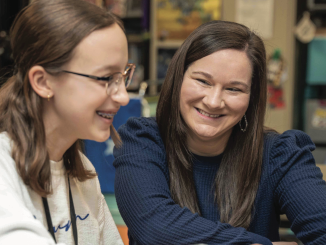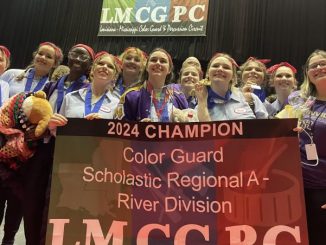
Child advocates train rigorously in support of River Parish kids
Most nonprofits would, in a perfect world, want to pay their volunteers. But for Louisiana’s Child Advocacy Services, being unpaid is, in fact, a key part of the job.
“Coming in as a community member who’s trained with no allegiance to anybody is … the soul of what CASA is,” St.Charles child advocate supervisor Courtney Galbreath.Court appointed special advocates, or CASA, volunteers are an often unknown but vital part of the child services process in the parish.
State law requires that each child be appointed an advocate to speak on their behalf. Though the Louisiana Supreme Court necessitates that these advocates meet with the children once a month, Galbreath said that in her seven years as supervisor she has never had an advocate do “the bare minimum.”
On Jan. 29, Judge Timothy Marcel swore in six new court appointed special advocates, or CASA, volunteers. CASA volunteers work with parents, Department of Child and Family Services, the courts, and the children themselves to find solutions that are in the best interest of the child. But achieving that trust doesn’t happen overnight.
“I was a nervous nelly about it,” recently sworn CASA volunteer Shirley Keller said. “I felt at first like it was overwhelming, but I knew that it would make a difference and I wanted to be a part of that difference.”
Keller, a retired kindergarten and 2nd grade teacher out of St. John Parish, knows a thing or two about childrens issues. The mother of two said she always knew she wanted to volunteer, and found a brochure in the library on the CASA program. With her two daughters out of the home, the retired educator set about completing her CASA training.
“When I was doing this I was thinking, ‘it’s been a long time, now I’m on the other side of the desk,’” Keller “[after completing coursework] I was like the child who went home with a star on her hand.”
In the past, training involved classes held approximately two times a week and on some Saturdays, as well as sitting in on court sessions. According to Galbreath, this was particularly hard for potential advocates in rural areas–or simply on the other side of the river.
“I’ve learned, since moving here, that people who live on [the West] side of the river don’t necessarily want to come to Destrehan for training,” Galbreath laughs.
Keller and fellow inductee Shellie Quinn had the opportunity to use the advocacy service’s new blended learning program.
The blended learning allowed Keller and Quinn and other advocates to study their 10-chapter binders from home and arrange sessions at the office to go over and confirm their mastery of the lessons. The training amounts to approximately 40 hours.
So far, the new training has worked to address a gap in advocacy services that, though closing, still leaves five children in the parish waiting for an advocate.
A fingerprint-based background check is also required of advocates.
“It’s a very in-depth training, but we make sure our advocates are of excellent quality when we go into court, because they have a huge role—they’re the eyes and ears of the judge,” Galbreath said.
Gwen Adams, a local district manager for a finance company who has volunteered as an advocate for almost two years, said the training is important. In her first case, a 14-year-old boy with no father or mother, who Adams described as having “pretty much everything go wrong for him,” was regularly acting out and doing drugs in an attempt to get attention. Today, she said, he’s on track, finishing school, and looks forward to going to college for information technology.
“Seeing the difference that was actually made in this child’s life, to see him over a year’s period progress—really, me being his voice … that was a very rewarding experience,” Adams said.
Galbreath noted that the advocates are often the only consistent presence children have in their lives as they move from different relatives’ homes to foster homes and sometimes back to their parents.
Case workers from the DCFS, Galbreath said, experience high turnover and are bound to certain geographic regions. Courts, case workers and even foster parents are often bound by state laws in what they can do for a child. The advocate is able to gain a holistic look at the child’s life and provide that insight to decision makers.
“In more instances than not, the advocate is the one that knows that child better than anybody else in the room,” Galbreath said.
Which is why, Galbreath said, its important to thoroughly train advocates, as well as monitor them for fatigue. She said that when Adams asked for two months off from her after being a year on her first case, it was immediately granted.
After the break, Adams came back in full force, more spirited than ever. Other considerations include commute times after a child moves and how well the advocates are performing on their current cases.
“Courtney actually had to cover mine last Wednesday because I had to work,” Quinn said.
“We work as a team, even with DCFS,” St. John advocate supervisor Michelle Duplantier added.
But it’s the sensitive nature of the work that all but necessitates that CASA advocates ultimately be unpaid and free of outside influence. Even a CASA supervisor can be too much for parents facing the loss of their children to a system that seems beyond their control. Keller said in her first case, she was accompanied by Duplantier while Keller met with the mother for the first time on Feb. 18.
At first, Duplantier said, the mother and her family members were “very stand-offish” and that you could “sense they were not pleased that there were two strangers watching them.”
When Duplantier stepped out of the room, Keller said she reassured the mother that she didn’t “work for anyone,” and that she just wanted the mother to get her daughter back.
“It was like this veil was lifted and she felt so much more comfortable when she realized I was working with her, and not against her,” Keller said. “She knew I wasn’t there to judge her and keep her child away from her.”
Though advocates vary in their approach, and every case is different, Adams, Quinn and Keller do share one quality: successful home life. Two of Quinn’s three children attended LSU, while Quinn’s first son is preparing for the University of Maryland after graduating from Destrehan. Keller’s youngest is a freshman at LSU, while her older daughter is an alum of Notre Dame living in Washington D.C. In addition to successful children, the three women have also held gratifying careers. Now they all seem to offer a piece of the love from their own experience to the community’s most vulnerable children.
“My children have been my passion” Quinn, a part-time dental hygienist, said. “I just hope I can give what I’ve given to my children to my CASA children.”




Be the first to comment